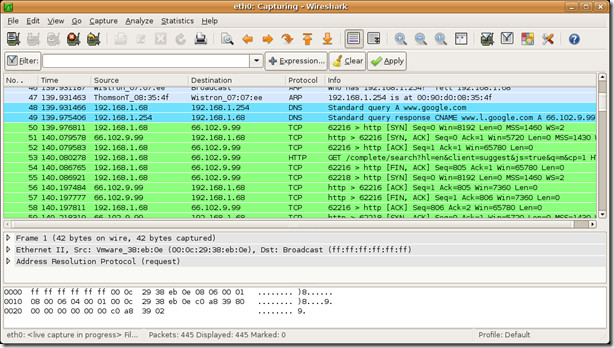WireShark – Awesome Network Packet Sniffer
Packet Sniffer, also called Packet Analyzer or Network Analyzer are special software that intercept, analyze, and log the traffic passing through the network. Wikipedia has better explanation on how sniffers work, “As data streams flow across the network, the sniffer captures each packet and eventually decodes and analyzes its content according to the appropriate RFC or other specifications.”
There are many sniffers out there, but WireShark is considered to be end-all network analyzing or monitoring tool. It is a cross-platform tool developed with the help from hundreds of network experts from all around the world. You can use it for network troubleshooting, software development, network monitoring, or simply for education purposes.
Below is an example of WireShark running on Ubuntu Linux.
Click the image above to enlarge.
Full set of features include:
- Deep inspection of hundreds of protocols, with more being added all the time
- Live capture and offline analysis
- Standard three-pane packet browser
- Multi-platform: Runs on Windows, Linux, OS X, Solaris, FreeBSD, NetBSD, and many others
- Captured network data can be browsed via a GUI, or via the TTY-mode TShark utility
- The most powerful display filters in the industry
- Rich VoIP analysis
- Read/write many different capture file formats: tcpdump (libpcap), Pcap NG, Catapult DCT2000, Cisco Secure IDS iplog, Microsoft Network Monitor, Network General Sniffer® (compressed and uncompressed), Sniffer® Pro, and NetXray®, Network Instruments Observer, NetScreen snoop, Novell LANalyzer, RADCOM WAN/LAN Analyzer, Shomiti/Finisar Surveyor, Tektronix K12xx, Visual Networks Visual UpTime, WildPackets EtherPeek/TokenPeek/AiroPeek, and many others
- Capture files compressed with gzip can be decompressed on the fly
- Live data can be read from Ethernet, IEEE 802.11, PPP/HDLC, ATM, Bluetooth, USB, Token Ring, Frame Relay, FDDI, and others (depending on your platfrom)
- Decryption support for many protocols, including IPsec, ISAKMP, Kerberos, SNMPv3, SSL/TLS, WEP, and WPA/WPA2
- Coloring rules can be applied to the packet list for quick, intuitive analysis
- Output can be exported to XML, PostScript®, CSV, or plain text
Enjoy!

